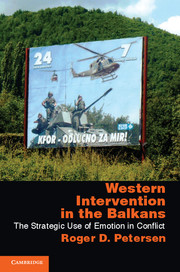Book contents
- Frontmatter
- Contents
- Acknowledgments
- Part 1 Background and Theory
- Part 2 Cases and Tests
- 7 Background to Western Intervention in the Balkans
- 8 The Case of the Roma in Kosovo
- 9 Background to Kosovo
- 10 Waiting for the West
- 11 Kosovo Intervention Games, I
- 12 Kosovo Intervention Games, II
- 13 Kosovo Conclusions
- 14 South Serbia
- 15 Macedonia
- 16 Bosnia
- 17 Montenegro
- 18 Conclusion
- Appendix A A Note on Names
- Appendix B Alternative Arguments
- References
- Index
- References
12 - Kosovo Intervention Games, II
from Part 2 - Cases and Tests
Published online by Cambridge University Press: 05 June 2012
- Frontmatter
- Contents
- Acknowledgments
- Part 1 Background and Theory
- Part 2 Cases and Tests
- 7 Background to Western Intervention in the Balkans
- 8 The Case of the Roma in Kosovo
- 9 Background to Kosovo
- 10 Waiting for the West
- 11 Kosovo Intervention Games, I
- 12 Kosovo Intervention Games, II
- 13 Kosovo Conclusions
- 14 South Serbia
- 15 Macedonia
- 16 Bosnia
- 17 Montenegro
- 18 Conclusion
- Appendix A A Note on Names
- Appendix B Alternative Arguments
- References
- Index
- References
Summary
After the March 2004 riots, Western leaders reassessed their strategy in Kosovo. Analysts and diplomats in the United States saw the riots as a wake-up call to push for final status. Europeans were more inclined to claim that violence should not be rewarded. Most importantly, Westerners knew that they could not credibly threaten to put off the status question indefinitely. To do so might bring on “another March 2004.”
Another change in the intervener game: standards with status
The interveners had come to accept that they needed to take Albanian threats into account and they had resigned themselves to the fact that Serbs were likely to defect for the foreseeable future. In terms of the 2×2 game, the broad contours of intervention strategy remained the same as with Standards before Status. The task was first to move the Albanian side to unilateral cooperation (T, S) and then eventually to get the Serbs on board to move the equilibrium to mutual reward (R, R). Although the broad strategy was similar, the tactics had changed. With the new policy, Standards with Status, the West did not threaten to withhold status, but rather promised to grant an independent status. Instead of being sequenced, the issues would be dealt with simultaneously.
- Type
- Chapter
- Information
- Western Intervention in the BalkansThe Strategic Use of Emotion in Conflict, pp. 184 - 192Publisher: Cambridge University PressPrint publication year: 2011



